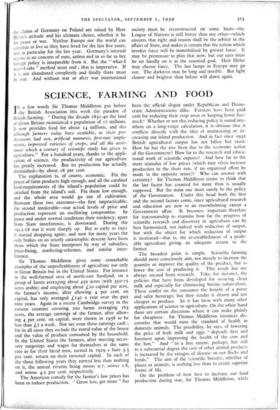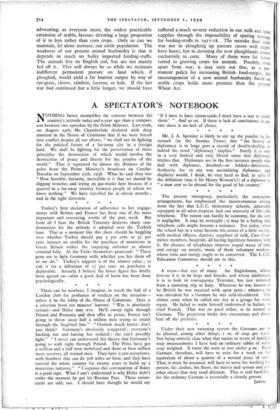SCIENCE, FARMING AND FOOD
I•1 a few words Sir Thomas Middleton put before the British Association this week the paradox of British farming. " During the decade 1831-40 the land of Great Britain maintained a population of 17 millions. It now provides food for about 14 millions, and this although farmers today have available, as their pre- decessors had not, artificial manures, first-rate imple- ments, improved varieties of crops, and all the assis- tance which a century of scientific study has given to agriculture." For a hundred years, thanks to the appli- cation of science, the productivity of our agriculture has greatly increased. But its production has actually diminished—by about 18 per cent.
The explanation is, of course, economic. Fix the prices of farm products high enough, and all the cardinal food-requirements of the island's population could be satisfied from the island's soil. Fix them low enough, and the whole area would go out of cultivation. Between these two extremes—the first impracticable, the second intolerable—our actual levels of price and production represent an oscillating compromise. In peace and under normal conditions their tendency, apart from State interference, is downward. During the 1914-18 war it went sharply up. But as early as 1921 it started dropping again; and now for many years the only brakes on an utterly catastrophic descent have been those which the State interposes by way of subsidies, price-fixing, marketing-schemes, and similar inter- ference.
Sir Thomas Middleton gives some remarkable examples of the unprofitableness of agriculture not only in Great Britain but in the United States. For instance in the well-farmed area of north-east Scotland, on a group of farms averaging about 450 acres (with 350-75 acres arable) and employing about L to capital per acre, the farmer's income, after allowing 4 per cent. on capital, has only averaged L140 a year over the past nine years. Again in a recent Cambridge survey in the eastern counties covering 200 farms averaging 163 acres, the average earnings of the farmer, after allow- ing 4 per cent on capital, were shown in 1938 to be less than £2 a week. Nor are even these earnings cash ; for in all cases they include the rental-value of the house and the value of produce consumed by the household. In the United States the farmers, after meeting neces- sary outgoings and wages for themselves at the same rate as for their hired men, earned in 1929 a bare 3.3 per cent. return on their invested capital. In each of the three following years they earned less than nothing on it, the annual returns being minus 0.7, minus 2.8, and minus 4.2 per cent. respectively.
The American remedy for the farmer's low prices has been to reduce production. " Grow less, get more " has been the official slogan under Republican and Demo- cratic Administrations alike. Farmers have been paid cash for reducing their crop areas or keeping fewer live- stock.' Whether or not this reducing policy is sound any- where on a long-range calculation, it is obvious that it conflicts directly with the idea of maintaining or in- creasing our island production. And in fact since 1932 British agricultural output has not fallen but risen. How far has the rise been due to the economic action of the Government? How far to the research and educa- tional work of scientific experts? And how far to the mere stimulus of low prices (which may often increase production in the short run, if no organised effort be made in the opposite sense)? Who can answer with certainty? Sir Thomas Middleton seems to think that the last factor has counted for more than is usually supposed. But the main one must surely be the policy of the Government. Under this head both the first and the second factors come, since agricultural research and education are now to an overwhelming extent a Government affair. It becomes important therefore for statesmanship to examine how far the progress of scientific research and discovery in agriculture can be best harmonised, not indeed with reduction of output, but with the object for which reduction of output is instituted—that is, the re-establishment of a profit- able agriculture giving an adequate return to the farmer.
The broadest point is simple. Scientific farming should more consciously aim, not merely to increase the quantity or improve the quality of the product, but to lower the cost of producing it. This result has not always ensued from research. Take, for instance, the policies that have been developed for assuring clean milk and especially for eliminating bovine tuberculosis. These confer on the consumer the benefit of a purer and safer beverage, but they render it dearer and not cheaper to produce. So it has been with many other applications of science to agriculture. On the other hand there are certain directions where it can make plainly for cheapness. Sir Thomas Middleton instances dis- coveries that would raise the standard of health in domestic animals. The possibility, he says, of lowering the price of both milk and eggs " depends first and foremost upon improving the health of the cow and the hen." And " to a less extent, perhaps, but still to a substantial degree the cost of other animal products is increased by the ravages of disease on our flocks and herds." The aim of the scientific breeder, whether of plants or animals, is nothing less than to create superior forms of life.
On the problem of how best to increase our food production during war, Sir Thomas Middleton, while advocating, as everyone must, the widest practicable extension of arable, favours devoting a large proportion of it to leys rather than corn crops. Only so can we maintain, let alone increase, our cattle population. The weakness of our present animal husbandry is that it depends so much on bulky imported feeding-stuffs. The animals live on English soil, but are not mainly fed off it. This will always be so while we maintain indifferent permanent pasture on land which, if ploughed, would yield a far heavier output by way of rye-grass, clover, sainfoin, lucerne, or kale. If the last war had continued but a little longer, we should have suffered a much severer reduction in our milk and meat supplies through the impossibility of sparing tonnage for feeding-stuffs in 1917-18. The mistake then made was not in ploughing up pasture (more well might have been), but in devoting the new ploughlands almost exclusively to corn. Many of them were far better suited to growing crops for animals. Possibly, even apart from war, it may turn out that, as a per_ manent policy for increasing British food-output, the encouragement of a new animal husbandry based on arable crops holds more promise than the present Wheat Act.



































 Previous page
Previous page